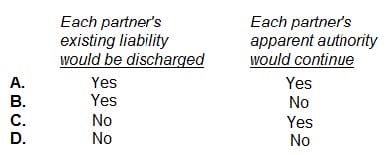Exam Details
Exam Code
:CPA-TESTExam Name
:Certified Public Accountant Test: Auditing and Attestation, Business Environment and Concepts, Financial Accounting and Reporting, RegulationCertification
:AICPA CertificationsVendor
:AICPATotal Questions
:1241 Q&AsLast Updated
:Jul 08, 2025
AICPA AICPA Certifications CPA-TEST Questions & Answers
-
Question 721:
Downs, Frey, and Vick formed the DFV general partnership to act as manufacturers' representatives. The partners agreed Downs would receive 40% of any partnership profits and Frey and Vick would each receive 30% of such profits. It was also agreed that the partnership would not terminate for five years. After the fourth year, the partners agreed to terminate the partnership. At that time, the partners' capital accounts were as follows: Downs, $20,000; Frey, $15,000; and Vick, $10,000. There also were undistributed losses of $30,000. Which of the following statements about the form of the DFV partnership agreement is correct?
A. It must be in writing because the partnership was to last for longer than one year.
B. It must be in writing because partnership profits would not be equally divided.
C. It could be oral because the partners had explicitly agreed to do business together.
D. It could be oral because the partnership did not deal in real estate.
-
Question 722:
Rivers and Lee want to form a partnership. For the partnership agreement to be enforceable, it must be in writing if:
A. Rivers and Lee reside in different states.
B. The agreement cannot be completed within one year from the date on which it will be entered into.
C. Either Rivers or Lee is to contribute more than $500 in capital.
D. The partnership intends to buy and sell real estate.
-
Question 723:
Heather, Erika, and Shelby are members in ABC LLC. Heather works 40 hours per week and Erika and Shelby work 20 hours per week. Heather contributed $30,000 to the LLC and Erika and Shelby contributed
$60,000 each. Erika and Shelby have each originated 45% of the LLC's business and Heather has
originated the other 10%.
If ABC were a general partnership, who controls management?
A. Heather, because she works the most.
B. Erika and Shelby equally because they contributed the most.
C. Heather, Erika, and Shelby equally because of state law.
D. Erika and Shelby, because they originate most of the work.
-
Question 724:
Eller, Fort, and Owens do business as Venture Associates, a general partnership. ABC Corp. brought a breach of contract suit against Venture and Eller individually. ABC won the suit and filed a judgment against both Venture and Eller. ABC will generally be able to collect the judgment from:
A. Partnership assets only.
B. The personal assets of Eller, Fort, and Owens only.
C. Eller's personal assets only after partnership assets are exhausted.
D. Eller's personal assets only.
-
Question 725:
On dissolution of a general partnership, distributions will be made on account of:
I. Partners' capital accounts.
II. Amounts owed partners with respect to profits.
III. Amounts owed partners for loans to the partnership.
In the following order:
A. III, I, and II.
B. I, II, and III.
C. II, III, and I.
D. III, II, and I.
-
Question 726:
Which of the following is not necessary to create an express partnership?
A. Execution of a written partnership agreement.
B. Agreement to share ownership of the partnership.
C. Intention to conduct a business for profit.
D. Intention to create a relationship recognized as a partnership.
-
Question 727:
In a general partnership, the authorization of all partners is required for an individual partner to bind the partnership in a business transaction to:
A. Purchase inventory.
B. Hire employees.
C. Sell goodwill.
D. Sign advertising contracts.
-
Question 728:
Locke and Vorst were general partners in a kitchen equipment business. On behalf of the partnership, Locke contracted to purchase 15 stoves from Gage. Unknown to Gage, Locke was not authorized by the partnership agreement to make such contracts. Vorst refused to allow the partnership to accept delivery of the stoves and Gage sought to enforce the contract. Gage will:
A. Lose, because Locke's action was not authorized by the partnership agreement.
B. Lose, because Locke was not an agent of the partnership.
C. Win, because Locke had express authority to bind the partnership.
D. Win, because Locke had apparent authority to bind the partnership.
-
Question 729:
The partners of College Assoc., a general partnership, decided to dissolve the partnership and agreed that none of the partners would continue to use the partnership name. Under the Revised Uniform Partnership
Act, which of the following events will occur on dissolution of the partnership?

A. Option A
B. Option B
C. Option C
D. Option D
-
Question 730:
Which of the following requirements must be met to have a valid partnership exist?
I. Co-ownership of all property used in a business.
II.
Co-ownership of a business for profit.
A.
I only.
B.
II only.
C.
Both I and II.
D.
Neither I nor II.
Tips on How to Prepare for the Exams
Nowadays, the certification exams become more and more important and required by more and more enterprises when applying for a job. But how to prepare for the exam effectively? How to prepare for the exam in a short time with less efforts? How to get a ideal result and how to find the most reliable resources? Here on Vcedump.com, you will find all the answers. Vcedump.com provide not only AICPA exam questions, answers and explanations but also complete assistance on your exam preparation and certification application. If you are confused on your CPA-TEST exam preparations and AICPA certification application, do not hesitate to visit our Vcedump.com to find your solutions here.